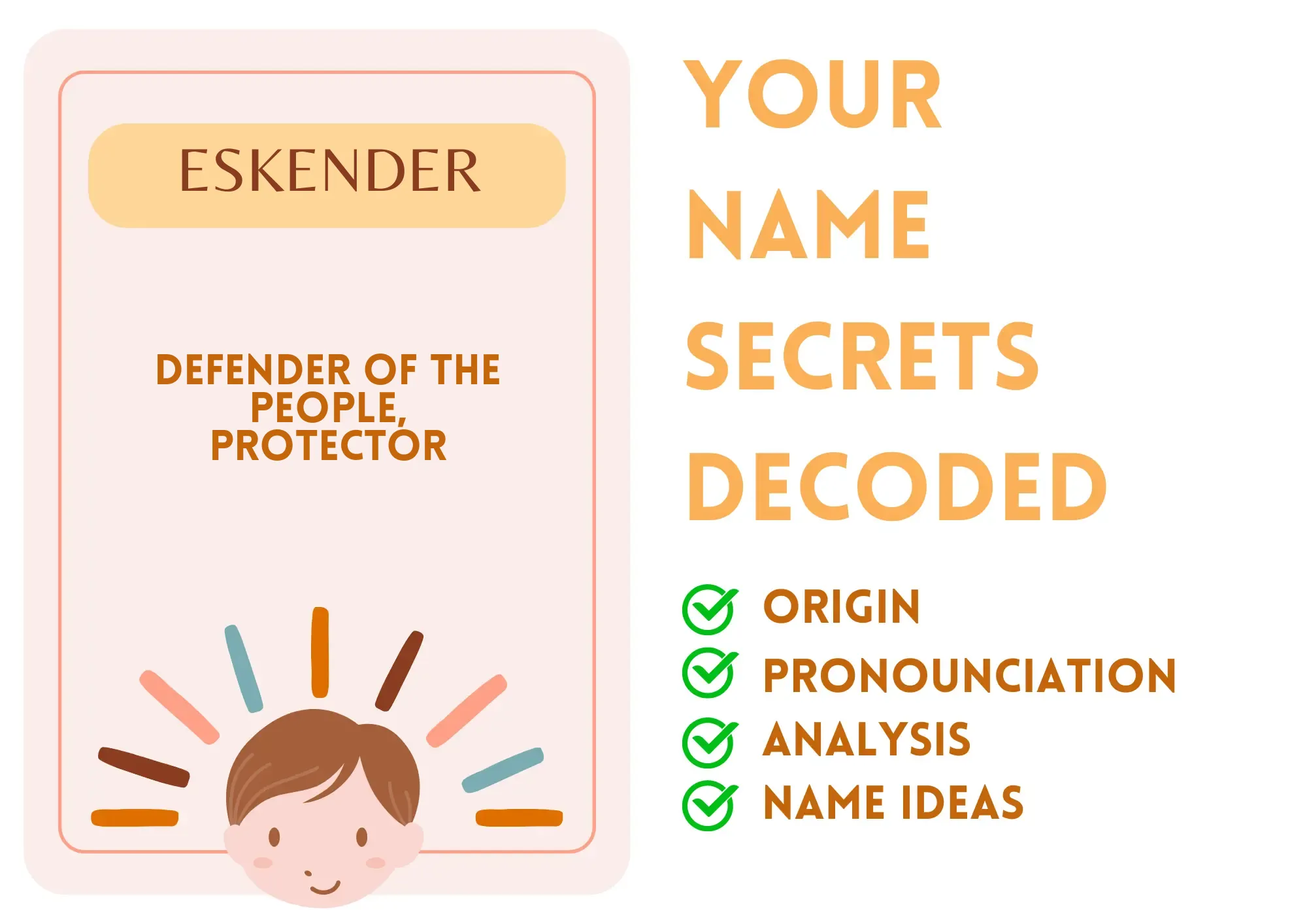
Eskender
Eskender is a culturally and historically rich name derived from the name Alexander, meaning "defender of the people" or "protector." It is predominantly used in Turkish and Arabic cultures, representing strength, leadership, and protection. Commonly male-oriented, Eskender is celebrated for its historical and cultural significance, often evoking images of heroic figures.
People perceive Eskender as a strong, noble name, suggesting leadership qualities and a sense of protection. Its writing and pronunciation are relatively straightforward, and it holds a timeless charm based on its historical roots.
The name carries a profound presence in various narratives and cultures, making it a favored choice among parents who wish to imbue their child with a name symbolizing strength and heroism.
Basic Information
Gender: Boy
Sounds Like: es-KEN-der
Pronunciation Explanation: The name emphasis is on the second syllable 'KEN', while the first and last syllables are softer.
Summary and Meaning
Meaning: defender of the people, protector
Origin: The name Eskender has Turkish and Arabic origins, evolving from the classic name Alexander, which hails from Greek roots.
Usage: Traditionally, Eskender is a masculine name, often associated with heroic and protective figures.
Name Number (Chaldean)
Name Number (Pythagorean)
Popularity (Global Rank)
Overall: 81619
Boys: 45944
Most Popular in
Religious and Cultural Significance
Religion: Islamic and Christian
Background: In Islamic culture, Eskender is revered, often linked to historic figures like Alexander the Great as well as Islamic depictions of a noble conqueror. In Christian contexts, it reflects similar heroic traits.
Cultural Significance: Eskender is often celebrated in stories that resonate with themes of bravery, leadership, and protection, commonly seen in literary and historical narratives.
Historical Significance: Eskender is often associated with Alexander the Great, a historical figure noted for his military conquests and leadership. The name has been carried by numerous rulers and military leaders throughout history, adding to its illustrious legacy.
Popular Culture
Literature and Mythology: Eskender appears in historical texts and tales, often symbolizing valor and leadership. It is present in epic stories that narrate the lives of great leaders.
Movies and Television: Eskender may not be a widely used character name, but its variations have appeared in films and TV series that delve into historical epics and adventures.
Feelings and Perceptions
Perception: Eskender is generally perceived as a strong, majestic name. It suggests bravery and a protective nature, appealing to those who admire heroic qualities.
Positive Feelings: Powerful, noble, heroic, strong, charismatic, and distinguished.
Negative Feelings: Some may find it less familiar or difficult to pronounce for non-native speakers.
Practical Considerations
Ease of Writing and Calling: Eskender is moderately easy to write and pronounce, containing three syllables. Its distinctness, however, may require some practice for those unfamiliar with it.
Common Typos and Misspellings: Eskander,Askender,Iskender,Eskendir
Common Nicknames: Eski,Kender,Ken
Eskender Popularity
Eskender Usage and Popularity By Country
| Country | Rank (Overall) |
|---|---|
| Eritrea | 535 |
| Ethiopia | 856 |
| Ukraine | 1734 |
| Kazakhstan | 8176 |
| Russia | 10204 |
| Iraq | 12134 |
| Tunisia | 15965 |
| Finland | 16139 |
| Panama | 16664 |
| Norway | 17240 |
Eskender Usage and Popularity By City
| City | Rank (Overall) |
|---|---|
| Washington | 12883 |
| Toronto | 14683 |
| London | 29264 |
| Houston | 17969 |
| Atlanta | 23447 |
| Silver Spring | 2360 |
Compatibility Analysis
Famous Persons Named Eskender
Related Names
Similar Sounding Names:
Alexander,Zander,Kendrick,Sander
Similar Meaning and Related Names:
Sibling Name Ideas (Brothers):
Sibling Name Ideas (Sisters):
Aylin ♀️
Turkish and Arabic cultures